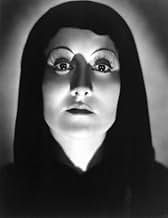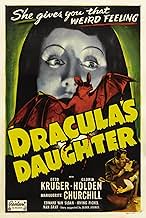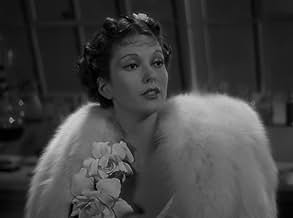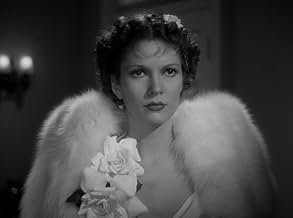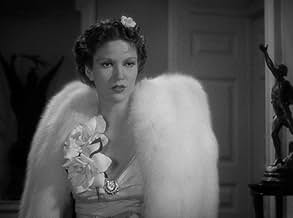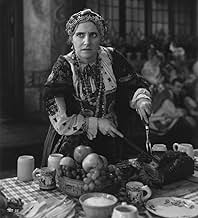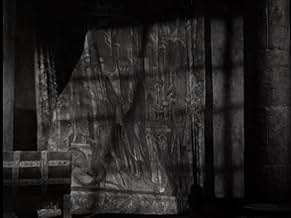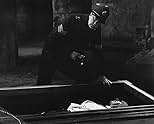AVALIAÇÃO DA IMDb
6,3/10
8,7 mil
SUA AVALIAÇÃO
Adicionar um enredo no seu idiomaWhen Countess Marya Zaleska appears in London, mysterious events occur that lead Dr. Von Helsing to believe that the Countess must be a vampire.When Countess Marya Zaleska appears in London, mysterious events occur that lead Dr. Von Helsing to believe that the Countess must be a vampire.When Countess Marya Zaleska appears in London, mysterious events occur that lead Dr. Von Helsing to believe that the Countess must be a vampire.
- Direção
- Roteiristas
- Artistas
- Prêmios
- 1 vitória e 1 indicação no total
Halliwell Hobbes
- Hawkins
- (as Halliwell Hobbs)
Claud Allister
- Sir Aubrey
- (as Claude Allister)
Agnes Anderson
- Elena
- (não creditado)
John Blood
- Bobby
- (não creditado)
David Dunbar
- Motor Bobby
- (não creditado)
Douglas Gordon
- Attendant
- (não creditado)
Owen Gorin
- Groom's Friend
- (não creditado)
Avaliações em destaque
As the last movie completed before the Laemmles were ousted from control of Universal, DRACULA'S DAUGHTER holds some interest as a place marker, surely; now, the men who had fought the patent trust and had largely given way to the next generation. Yes, Zukor was hanging in as Chairman at Paramount, but with vastly curtailed power; DeMille was beginning his own renaissance -- by becoming a parody of himself -- and Lasky was still fading, although he would continue to produce increasingly ponderous prestige films over the next dozen years. Only Goldwyn would prosper -- but no one liked him.
But this is Dracula's Daughter I'm talking about, and it's just fine. I like Lambert Hillyer's frequently matter-of-fact handling of the movie, with its complicated lesbian and Triple-Goddess subtext. I can't see all the money on the screen (over a quarter of a million dollars -- a huge sum for Universal), but I am amused by the opening, with its "All right, Doctor, you've killed Count Dracula. You're claiming an insanity defense, are you?" attitude.
But this is Dracula's Daughter I'm talking about, and it's just fine. I like Lambert Hillyer's frequently matter-of-fact handling of the movie, with its complicated lesbian and Triple-Goddess subtext. I can't see all the money on the screen (over a quarter of a million dollars -- a huge sum for Universal), but I am amused by the opening, with its "All right, Doctor, you've killed Count Dracula. You're claiming an insanity defense, are you?" attitude.
In London, two policemen find the body of a man, Renfield, with neck broken and Dracula with a stake through his heart. They arrest Prof. Von Helsing (Edward Van Sloan) that tells that he did it and take him to the Scotland Yard. The inspector Sir Basil Humphrey (Gilbert Emery) asks Von Helsing who might defend him and the professor asks for the psychiatrist Dr. Jeffrey Garth (Otto Kruger). Meanwhile, the mysterious Countess Marya Zeleska (Gloria Holden), who is Dracula's daughter, compels the policeman that is in charge to take care of the bodies and takes Dracula's body with her to bury him with her assistant Sandor (Irving Pichel) before dawn, expecting to be released from the family's curse.
In Edinburgh, Jeffrey is hunting with friends and his assistant Janet Blake (Marguerite Churchill) comes to tell him that he has an appointment with the Scotland Yard to help his friend Von Helsing. When Von Helsing tells him about Dracula, Jeffrey believes that he is obsessed with the vampire and promises to help him. During the night, he goes to a party where he meets the Hungarian Countess and he tells his theories about the vampire blood thirsty that he believes is an obsession. Now, Countess Zeleska believes that Jeffrey can heal her and release her from her blood thirsty and she wants to bring him to her castle to spend the eternal life with her in Transylvania.
"Dracula's Daughter" is a great vampire movie, with the dramatic story of a vampire woman that wishes to be free from the curse of her father, Dracula. The plot is naive and funny, and the relationship between the annoying Jeffrey and the witty Janet is amusing. This is one of the best movies of Universal Studios in this genre. My vote is seven.
Title (Brazil): "A Filha de Drácula" ("The Dracula's Daughter")
In Edinburgh, Jeffrey is hunting with friends and his assistant Janet Blake (Marguerite Churchill) comes to tell him that he has an appointment with the Scotland Yard to help his friend Von Helsing. When Von Helsing tells him about Dracula, Jeffrey believes that he is obsessed with the vampire and promises to help him. During the night, he goes to a party where he meets the Hungarian Countess and he tells his theories about the vampire blood thirsty that he believes is an obsession. Now, Countess Zeleska believes that Jeffrey can heal her and release her from her blood thirsty and she wants to bring him to her castle to spend the eternal life with her in Transylvania.
"Dracula's Daughter" is a great vampire movie, with the dramatic story of a vampire woman that wishes to be free from the curse of her father, Dracula. The plot is naive and funny, and the relationship between the annoying Jeffrey and the witty Janet is amusing. This is one of the best movies of Universal Studios in this genre. My vote is seven.
Title (Brazil): "A Filha de Drácula" ("The Dracula's Daughter")
"Dracula's Daughter" is a trailblazer in many respects. It's the earliest film I can think of that features a truly sympathetic vampire protagonist. It's also the earliest mainstream film that I'm aware of with such a strong lesbian subtext. (Actually, it's not even a "sub" text, it's plain as day!) As you might expect, these rather surprising elements make it a highly memorable viewing experience - perhaps even more memorable than its predecessor, Lugosi's "Dracula," which is basically just a truncated version of Bram Stoker's novel.
Unfortunately, "Dracula's Daughter" misses the mark of greatness that it probably deserves. The film is only about an hour and ten minutes long, so there isn't sufficient time to fully develop Countess Zaleska, the title character. And it's extremely frustrating that the first fifteen minutes or so are basically squandered on a lot of painfully unfunny business involving two comedy constables. The humor has aged really, really badly, unless you somehow find it convulsively hilarious when one of the constables reacts to every strange and dramatic happening around him by saying "oooh..."
I tend to complain that modern-day horror features too much dumb comedy that hurts its credibility, but "Dracula's Daughter" is living proof that studios were injecting silly rubbish into otherwise good horror material as long as seventy years ago!
The serious parts of the film work well, however. Countess Zaleska and her faithful servant, Sandor, have some interesting exchanges about the loneliness of immortality and the darkness of the vampire's universe. The scene when Zaleska burns her father's body is also very moody and dramatic. (How does one get a job like Sandor's, anyway? Don't you think it would be fun to play personal servant to a glamorous female vampire? No? Maybe it's just me, then.)
If the film has another flaw, aside from the comedy, it's the human protagonist, Dr. Garth. Otto Kruger plays the character as stubborn and really rather abrupt. He'll spew a few lines of psycho-babble at the countess, then charge out of the room and leave his job with her half-done at best. A more attentive psychiatrist might perhaps have made for a more sympathetic and proactive hero. As it is, he's basically just an irritating presence who distracts us from the "villains," who are infinitely more interesting and more worthy of our time.
Unfortunately, "Dracula's Daughter" misses the mark of greatness that it probably deserves. The film is only about an hour and ten minutes long, so there isn't sufficient time to fully develop Countess Zaleska, the title character. And it's extremely frustrating that the first fifteen minutes or so are basically squandered on a lot of painfully unfunny business involving two comedy constables. The humor has aged really, really badly, unless you somehow find it convulsively hilarious when one of the constables reacts to every strange and dramatic happening around him by saying "oooh..."
I tend to complain that modern-day horror features too much dumb comedy that hurts its credibility, but "Dracula's Daughter" is living proof that studios were injecting silly rubbish into otherwise good horror material as long as seventy years ago!
The serious parts of the film work well, however. Countess Zaleska and her faithful servant, Sandor, have some interesting exchanges about the loneliness of immortality and the darkness of the vampire's universe. The scene when Zaleska burns her father's body is also very moody and dramatic. (How does one get a job like Sandor's, anyway? Don't you think it would be fun to play personal servant to a glamorous female vampire? No? Maybe it's just me, then.)
If the film has another flaw, aside from the comedy, it's the human protagonist, Dr. Garth. Otto Kruger plays the character as stubborn and really rather abrupt. He'll spew a few lines of psycho-babble at the countess, then charge out of the room and leave his job with her half-done at best. A more attentive psychiatrist might perhaps have made for a more sympathetic and proactive hero. As it is, he's basically just an irritating presence who distracts us from the "villains," who are infinitely more interesting and more worthy of our time.
The best of the Universal Dracula films will always be the one from 1931 with Bela Lugosi, which is one of the best and most iconic Universal Studios horrors. But its follow-ups generally are worth a look; Son of Dracula despite Lon Chaney Jnr's miscast Dracula was much better than expected, being a good-looking film with a lot of atmosphere and at least two scenes among the best of any Universal Studios Gothic horror film but House of Dracula while watchable was disappointing apart from a couple of effective sequences, nice sets and a few good performances but did suffer mainly from having too many ideas and not enough time to explore them.
Dracula's Daughter however is the best of them. Is it as good as the 1931 film? No, but it almost is. Two or three things do bring it down. The humour at the beginning with the cops was incredibly hokey and more overly-silly and misplaced than funny. Otto Kruger is an unappealingly stiff male lead, Garth has some very abrupt decision-making that Kruger overdoes to the point it gets annoying. And while the banter between him and Marguerite Churchill's Janet was very enjoyable and witty there was a little too much of it, it could have taken up less of the film and the film could have focused more on Von Helsing. Personal opinion of course.
On the other hand, Dracula's Daughter has great production values. The costumes and sets are sumptuous and splendidly Gothic and the film's beautifully photographed too. The music score, actually sounding original and not stock, compliments the mood very well and has to be one of the eeriest of any of the music scores in the Universal horrors. Dracula's Daughter is wittily scripted as just as I appreciated the film noir-ish-like direction of Son of Dracula I also appreciated the sombre, moody approach that the direction in Dracula's daughter took. The story, apart from the hokey start, is fun and atmospheric, there is a real eeriness but a poignant edge too. Of individual scenes the scene with the Countess Zaleska and Lilli is infamous and for a reason. Apart from Kruger the acting is good, Marguerite Churchill is amusing and Edward Van Sloan once again brings class to Von Helsing but the most memorable turns are from Irving Pichel and especially Gloria Holden. Pichel is effectively sinister especially towards the end while Holden is unforgettable in the title, subtly creepy but somewhat tragic.
All in all, not as good as the 1931 film but of the Dracula sequels Universal made to me Dracula's Daughter's the best one. 8/10 Bethany Cox
Dracula's Daughter however is the best of them. Is it as good as the 1931 film? No, but it almost is. Two or three things do bring it down. The humour at the beginning with the cops was incredibly hokey and more overly-silly and misplaced than funny. Otto Kruger is an unappealingly stiff male lead, Garth has some very abrupt decision-making that Kruger overdoes to the point it gets annoying. And while the banter between him and Marguerite Churchill's Janet was very enjoyable and witty there was a little too much of it, it could have taken up less of the film and the film could have focused more on Von Helsing. Personal opinion of course.
On the other hand, Dracula's Daughter has great production values. The costumes and sets are sumptuous and splendidly Gothic and the film's beautifully photographed too. The music score, actually sounding original and not stock, compliments the mood very well and has to be one of the eeriest of any of the music scores in the Universal horrors. Dracula's Daughter is wittily scripted as just as I appreciated the film noir-ish-like direction of Son of Dracula I also appreciated the sombre, moody approach that the direction in Dracula's daughter took. The story, apart from the hokey start, is fun and atmospheric, there is a real eeriness but a poignant edge too. Of individual scenes the scene with the Countess Zaleska and Lilli is infamous and for a reason. Apart from Kruger the acting is good, Marguerite Churchill is amusing and Edward Van Sloan once again brings class to Von Helsing but the most memorable turns are from Irving Pichel and especially Gloria Holden. Pichel is effectively sinister especially towards the end while Holden is unforgettable in the title, subtly creepy but somewhat tragic.
All in all, not as good as the 1931 film but of the Dracula sequels Universal made to me Dracula's Daughter's the best one. 8/10 Bethany Cox
Dracula's Daughter begins right where Tod Browning's Dracula left off, and ironically sees vampire slayer, Van Helsing in trouble with the law for the murder of Count Dracula. This follow up doesn't have the same quality feel about it that the original had, and it seems clear that this was always meant to be very much a 'B' movie picture. But at the same time, its lots of fun to watch; and the fact that it begins straight after the ending of the Bela Lugosi film ensures that it's credible as far as Universal's series is concerned, and that fact will also give many fans of the original film a good reason to see it. The plot starts properly when a young woman turns up at the police station, wanting to know if Count Dracula really is dead. We then follow her as she tries to undo her family curse, aided by psychiatrist Dr. Jeffrey Garth. However, around the same time that this is going on; corpses begin appearing around London, and jailed Van Helsing is convinced that vampires are roaming the streets of London again.
Unfortunately, this follow up doesn't feature the bloodsucking demon of the first film, and as the title suggests; follows his daughter instead. Gloria Holden excels in the title role as the daughter of Dracula. She's seductively sexy and has a definite air of understated evil about her at the same time. The rest of the support cast back her up excellently, and while nobody other than the title character is a real standout; the ensemble comes together nicely. Atmosphere is obviously a big thing here, and director Lambert Hillyer does a great job of photographing the locations, and ensures that the film benefits from a malevolent aura at all times. The story is obviously nowhere near as great as the original, which was based on the novel by Bram Stoker; but it's good enough. Writing a follow-up to Dracula can't be easy, and while the plot isn't too engaging, it's always at least interesting. There's an underscore of black humour hanging around just behind the central plot, and overall I would say this is a worthy sequel, although it's not a patch on the original film.
Unfortunately, this follow up doesn't feature the bloodsucking demon of the first film, and as the title suggests; follows his daughter instead. Gloria Holden excels in the title role as the daughter of Dracula. She's seductively sexy and has a definite air of understated evil about her at the same time. The rest of the support cast back her up excellently, and while nobody other than the title character is a real standout; the ensemble comes together nicely. Atmosphere is obviously a big thing here, and director Lambert Hillyer does a great job of photographing the locations, and ensures that the film benefits from a malevolent aura at all times. The story is obviously nowhere near as great as the original, which was based on the novel by Bram Stoker; but it's good enough. Writing a follow-up to Dracula can't be easy, and while the plot isn't too engaging, it's always at least interesting. There's an underscore of black humour hanging around just behind the central plot, and overall I would say this is a worthy sequel, although it's not a patch on the original film.
Você sabia?
- CuriosidadesOriginally, Universal wanted to make a sequel based on Bram Stoker's short story 'Dracula's Guest' and negotiated with Stoker's widow Florence. During the talks between the two, it was discovered that Bram Stoker had not complied with one requirement of the U.S Copyright office with his novel 'Dracula', which rendered it public domain in the United States. Because Florence wanted more creative control over the sequel, and Bela Lugosi wanted more money to reprise the role of Count Dracula, Universal instead hired John L. Balderston to write a new story.
- Erros de gravaçãoAlthough the film takes place mostly in London, telephones consistently ring one ring at a time, whereas British phones have always used a double ring.
- Citações
Lady Esme Hammond: Sherry, Marya?
Countess Marya Zaleska: Thank you, I never drink... wine.
- ConexõesFeatured in Shock Theater: Dracula's Daughter (1959)
Principais escolhas
Faça login para avaliar e ver a lista de recomendações personalizadas
Detalhes
- Data de lançamento
- País de origem
- Centrais de atendimento oficiais
- Idiomas
- Também conhecido como
- La hija de Drácula
- Locações de filme
- Empresa de produção
- Consulte mais créditos da empresa na IMDbPro
- Tempo de duração
- 1 h 11 min(71 min)
- Cor
- Proporção
- 1.37 : 1
Contribua para esta página
Sugerir uma alteração ou adicionar conteúdo ausente


